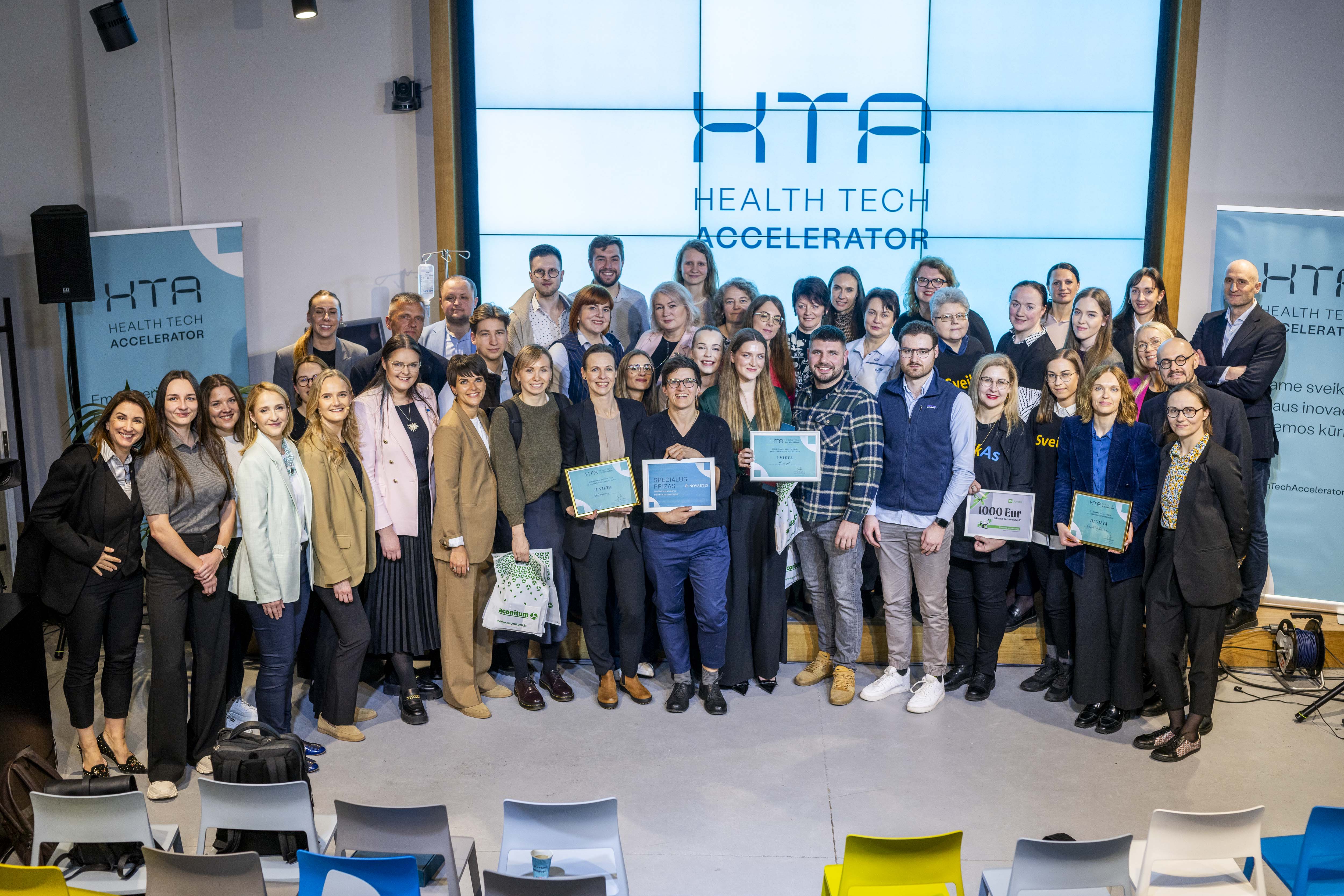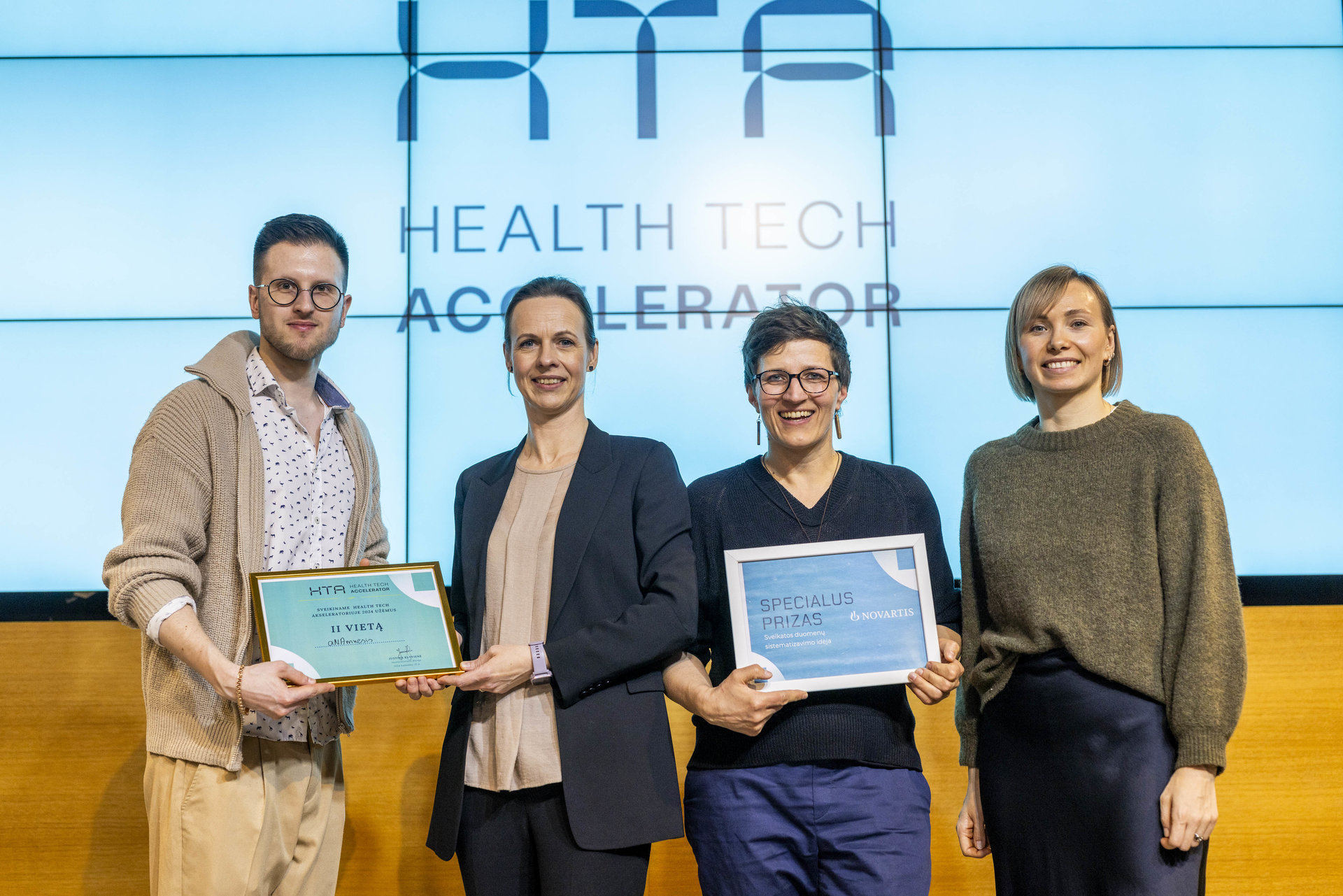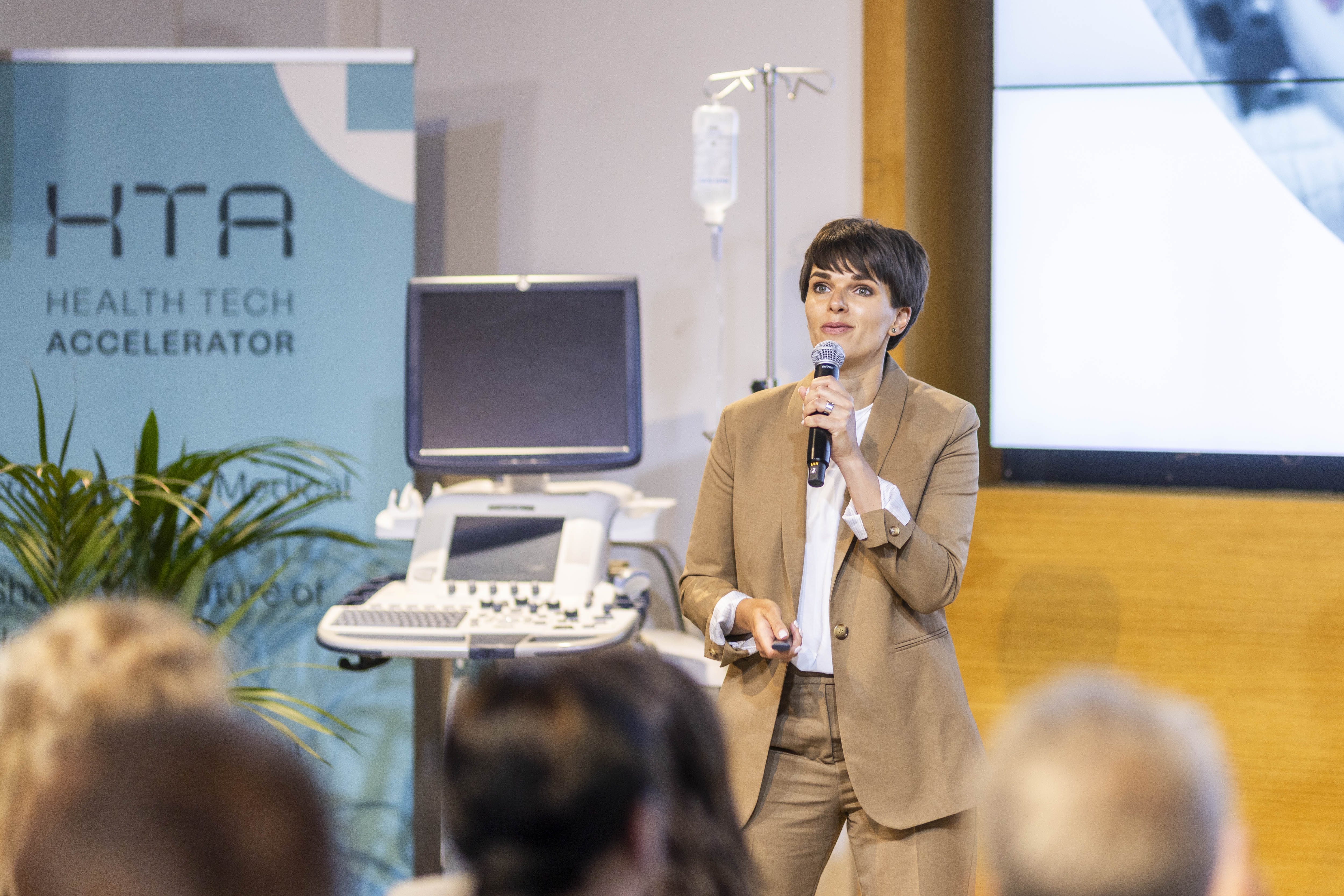 Health Tech Accelerator finals / Photo by I. Gėlūnas
Health Tech Accelerator finals / Photo by I. Gėlūnas
The finals of the Health Tech Accelerator (HTA) took place last month. It was the crowning moment of the 2-month-long health innovation programme that brought together doctors, nurses, startup representatives and innovation enthusiasts. The final event showcased 15 of the best ideas that will transform the healthcare system: from a contactless tool for measuring vital signs to a virtual wellness guide for breast cancer patients.
Two teams from the Faculty of Medicine at Vilnius University, Anamnesis and ProNeoMetrics, reached the finals of the HTA programme. Anamnesis, led by Dr Agnė Jagelavičienė, assistant professor at the Children’s Hospital of the VU MF and a paediatric pulmonologist-allergist, achieved second place in the final. During the 7-week programme, the team created a summary of patient history based on the use of artificial intelligence and e-health systems. The ProNeoMetrics team, led by Rūta Morkūnienė, a doctoral student and a teaching assistant at the Department of Anatomy, Histology, and Anthropology, which is part of the Institute of Biomedical Science at the University, proposed a tool for the assessment of the early development and psychomotor development of premature infants. The leaders of the MF teams that made it to the HTA finals agreed to share their experiences of the event with us and talk about their projects.
 Anamnesis team / Photo by I. Gėlūnas
Anamnesis team / Photo by I. Gėlūnas
An automated summary of a patient’s health to improve the quality of services
“The idea behind participating in the HTA was to consider how to improve the quality of patient care and at the same time make doctors’ work easier. In order to provide quality health services that cross-reference beyond a single visit, it is essential that patient data is properly and accurately recorded and summarised. A consultation with a patient usually starts with the doctor taking a medical history. To properly assess the causes of the condition, doctors not only interview the patient, but also go through the patient’s previous medical records, a time-consuming part of the visit. However, relying solely on referrals and a patient’s story makes an incomplete history. There are many different parts of the puzzle that the doctor must connect. Human memory is limited, so using artificial intelligence to organise the data seems not only logical, but also inevitable,” Dr Jagelavičienė, the head of the Anamnesis project team, explained.
According to the researcher, the regular use of a medical history algorithm would allow every doctor to be a true expert in their field, without omitting important details of the patient’s life and medical history. Information extracted from previously generated medical records would be structured and visible to the doctor according to the specifics of the patient’s referral before they even entered the doctor’s office. Communication between the patient and doctor would be much simpler and clearer, avoiding errors made by patients and doctors through forgetfulness, inattention or haste. “Summarising information in the patient’s history based on the reason for the referral would add to the time required for the physical examination of the patient, provide useful information for a more accurate diagnosis of the disease, assess drug interactions, and so on. The doctor could dedicate the time saved to interacting with the patient rather than the computer screen looking for data and filling in medical records. There is currently no such product in Lithuania that could provide a systematic structured summary of a patient’s medical history for a medical specialist based on the reasons for the patient’s referral,” the doctor noted.
Dr Jagelavičienė thanked the members of the Anamnesis team, the organisers of the event, and other participants, and concluded, “Being awarded second place gave me confidence, a feeling that what we were doing was really meaningful and useful. Although we didn’t know each other prior to the HTA, we maintained contact after the end of the programme and are looking for ways to continue the work. I would like to thank Asta Pukaitė-Kajokė, a product development, marketing, and IT specialist; Benediktas Bachmetjevas, a 5th-year medical student experimenting with artificial intelligence; and Jolanta Valentienė, a public health specialist with extensive knowledge in e-health development and strategies. Throughout the HTA programme, we were accompanied and supported by a wonderful mentor, Renata Daukšienė, a specialist in the development of personalised medicine strategies. In fact, throughout the HTA programme we felt great support from all teams, and the creative atmosphere of Justina Klyvienė’s team was a great source of confidence and knowledge.”
 Rūta Morkūnienė / Photo by I. Gėlūnas
Rūta Morkūnienė / Photo by I. Gėlūnas
Preventive app would help parents assess health issues of premature infants
“I joined the Health Tech Accelerator to offer a tool for parents of premature infants at the time when active early health monitoring usually ends and families of premature babies are left to solve the various health issues that might occur. This is the period from about 1–2 years of age to school age, when we still have the opportunity for timely intervention,” Rūta Morkūnienė explained.
ProNeoMetrics presented how key areas of research have been streamlined: general development and psychomotor development (gross and fine motor skills and cognitive, language, emotional, social, and psychological development), which are interdependent and therefore best suited to a holistic approach. “We collaborated with the two main associations in Lithuania for parents of premature infants: Neišnešiotukas and Padedu Augti. We interviewed the parents, identified their main concerns, and recognised their desire to be more knowledgeable about their child’s health and their wish to be proactive in these processes,” the team leader said.
According to Morkūnienė, the ongoing aim of this study is to collaborate further with parents of premature infants and use the expertise of medical specialists to develop for parents a personalised healthcare application based on validated medical instruments. The application would encourage parents to be proactive in improving their infant’s health. “Parents could use the main health checklist for premature infants and receive immediate and specific advice on what exercises and tasks they should perform at home, or while waiting for an appointment with a specialist. Parents would be able to see the change in their child’s development over time, follow the progress of their child’s psychomotor development, and be proactive in the process. Ideally, the results would be visible to the specialist and would allow for a more efficient and constructive use of the time allotted for their appointment,” Morkūnienė noted.
Morkūnienė explained how reaching the Health Tech Accelerator finals would not have been possible without the contribution of the entire team. “This is not the first time I have worked with Dovilė Kurpyte-Lipnicke, an electronics engineer, on a health innovation project. Stanislavas Sabaliauskas, associate professor of Physical Education and Sports at VU MF, and Taira Sirvydaitė, an obstetrician and lecturer in child and family nursing at Klaipėda State University of Applied Sciences, also joined the Health Tech Accelerator to develop this particular idea. I am pleased that I decided to participate in the HTA. It has been an educational journey through the ecosystem of health startups with great international speakers, leaders and mentors who shared their knowledge and experience! The contacts broadened my horizons on the future issues of medicine, artificial intelligence, and business and the challenges of embarking on such a journey.”
